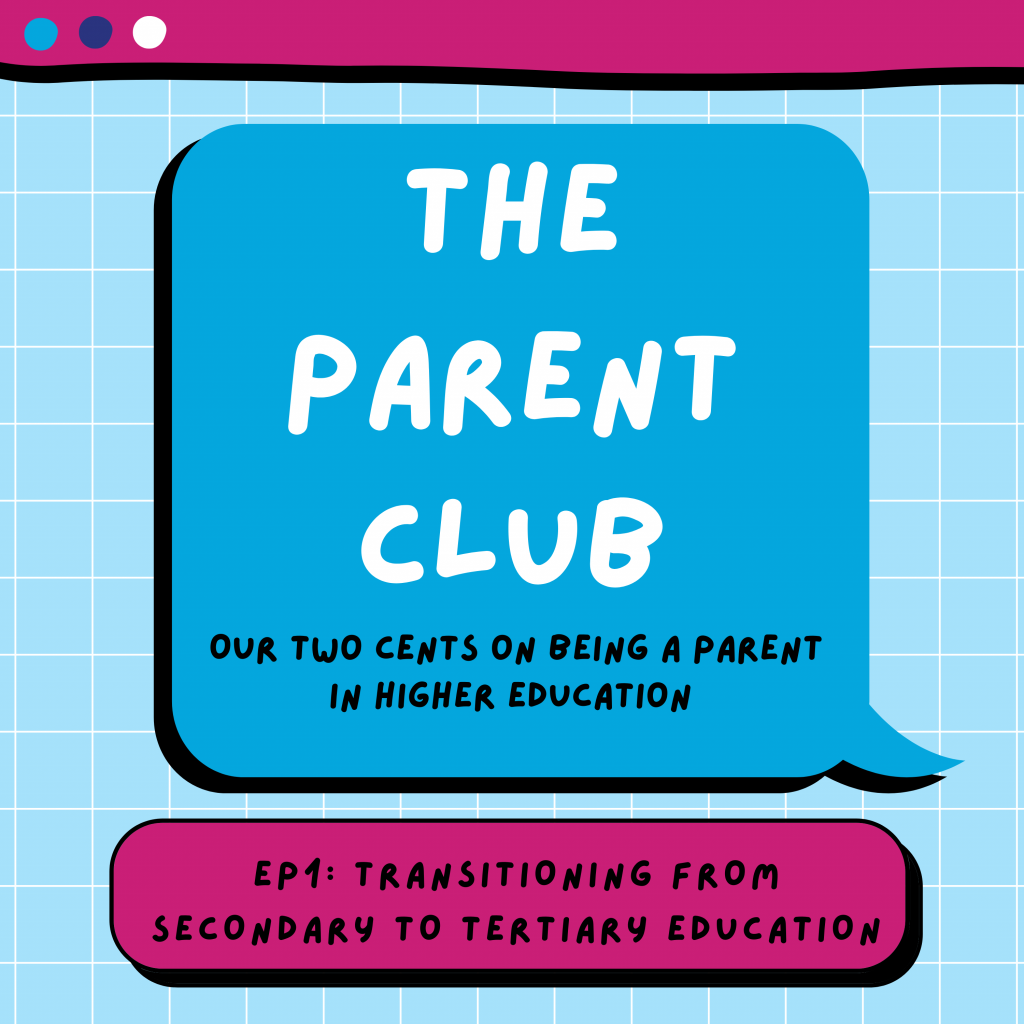
We are delighted announce the first episode of our ‘The Parent Club’ Podcast about Secondary to Tertiary Education Podcast!
In this inaugural episode, we’ll be discussing the transition from secondary school to higher education, hoping to put a modern spin on our recent coffee mornings discussing other educational transitions.
We recently had great success with our Preschool to Primary Coffee Morning, and we’re looking forward to our Primary to Secondary Coffee Morning on 1st September – you can sign up for free here: NU Parents- Coffee Morning – Transitioning from Primary to Secondary School (ncl.ac.uk)
Click Here for the Podcast
If you’re interested in a particular question or topic we discuss in this episode, here are some timestamps:
- Introductions – 00:00:20
- Feelings about moving to University – 00:04:01
- Application Process – 00:10:04
- Support Available – 00:21:22
- Effect of COVID-19 on University – 00:28:55
- Support and Preparation– 00:40:55
- Positive and Negatives of moving to university – 00:46:21
- Top Three Tips– 00:57:29
Hosted by Niamh, the podcast has special guests: Ashley Callard who is an Access and Engagement Manager at Durham University, and co-chair of Durham MAMS Network; El Forsyth is a writer and psychology student who has first-hand experience of navigating disability support in higher education; last but not least, Paula Fitzpatrick is Head of Information Services at Newcastle University’s Library Team, and a mother of three children, two of whom are university students. We also have our two interns Sandhaya and Chiara adding their own advice during the discussions.
Our panel represents the staff, student, and parent perspective on the university experience, to provide the most detailed information and advice for prospective students and their families.
Top Tips
If you aren’t able to listen to the full podcast today, Niamh caught up with El Forsyth and Alexandra Theodosiou, both students at Newcastle University who have lived through the pandemic in higher education, and asked them for their top three tips for students arriving at university for the first time:
El:
- Encourage your children to join Facebook and Instagram groups for Freshers and for the different accommodations at their university. This will help them connect with other students and find out what’s on; Freshers’ Week is a lot less daunting if you know who you’ll be living with and can plan.
- Teach your children how to cook and clean independently across a variety of environments, so they won’t be completely helpless when they arrive. Make sure they have recipe books, and be patient and understanding if you get a call asking how to boil an egg at 6AM!
- Talk to your children about mental health; rather than thinking ‘it won’t happen to my child’, take the initiative to advise them about it, even if they are still in sixth form. If they do slip into a dark place, the advice you gave them might help them to access the correct support.
Alexandra:
- The amount of work you have to do is larger than you think. Start work as soon as you receive it, watch lectures and do readings ideally the week before so you can always be on top in case something happens and you encounter a busy week. A lot of research is expected. Find a few go-to websites you like for resources (i.e. JSTOR) that you can always turn to when you need extra references.
- Talk with your personal tutor as soon as you notice a setback. They’re there to help you with anything, even just listen to your problem, and they will definitely do whatever they can to help adjust education to your needs i.e. extend deadlines, set up one-on-one meetings with professors.
- Your sleep schedule will most probably be altered heavily, because of deadlines, nights out, noisy flatmates and many other reasons. Naps are your best friend! If you can’t seem to allow yourself to get 8 hours of sleep a night, don’t be scared to alter your sleep schedule and try different patterns, maybe you prefer working at night or early in the morning, you can split your sleep in two 4-hour cycles and utilise the hours you prefer. As long as you feel rested, if it works for you it’s correct.
Thank you so much to Ashley, El, Paula, and Alexandra for their contributions, and for giving up their time to support our campaign. We really appreciate your insight, and we know that our parents and families in the Network will too.
Here are some helplines and resources if you are a student or parent of a student who may need additional support:
Nightline Instant Messaging (For Newcastle University Students): Nightline (nusu.co.uk)
Samaritans: 116 123 or jo@samaritans.org
UCAS Undergraduate Phoneline: 0371 468 0 468
